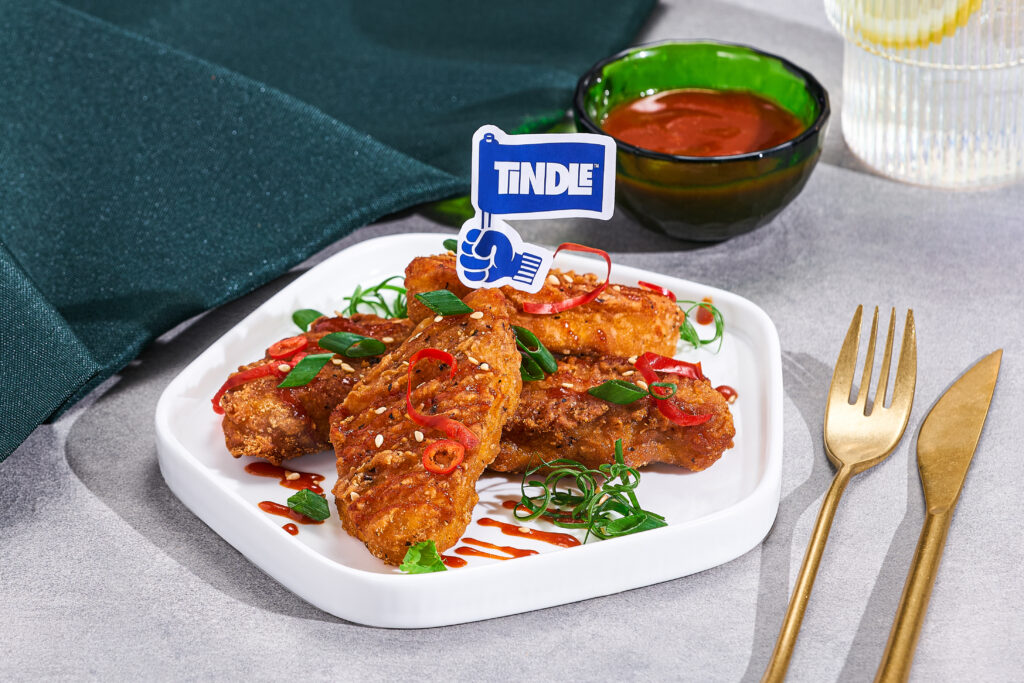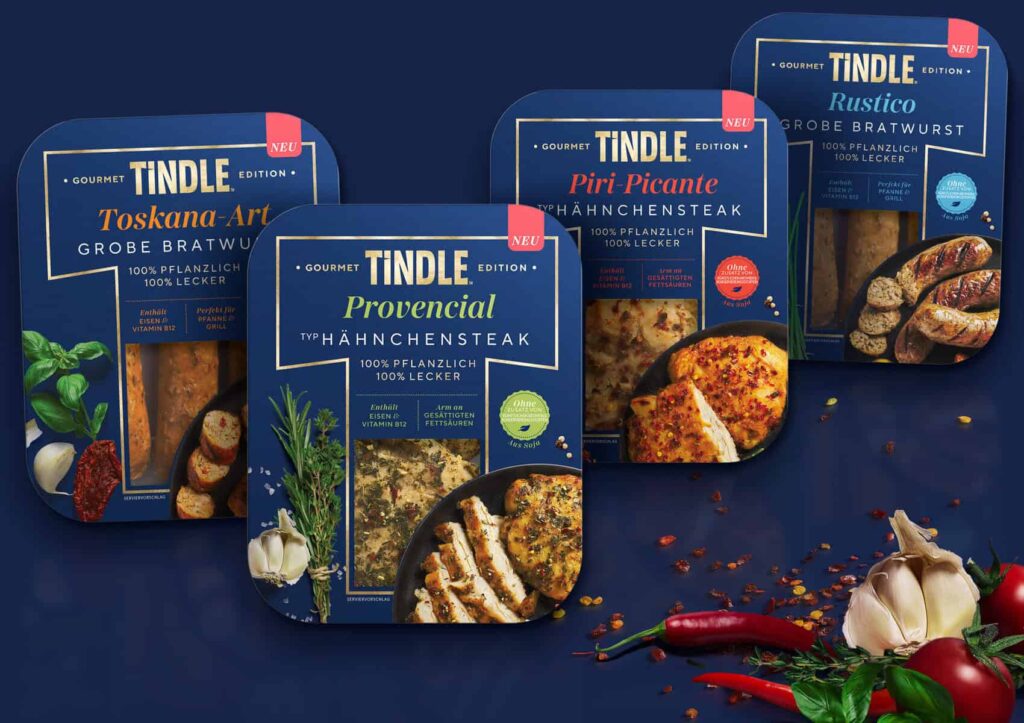‘Capital Preservation’ Key for TiNDLE Foods After Sales Growth with 9x Retail Expansion
7 Mins Read
Plant-based meat maker TiNDLE Foods is keeping tabs on tariffs and the UPF conversation as it builds on revenue growth with retail expansions and prioritises cash reserves.
It’s never easy to be a business leader, and it feels particularly arduous right now, especially if you work in the food system.
For plant-based meat companies, the macroeconomic challenges that come with global tariffs are only compounded by investors’ resistance to the category and consumer criticism over ultra-processing.
“The main thing we’re advising founders is to stay focused on what they can control, which is to keep burn in check and extend runway,” one investor told Green Queen last week.
It seems like Timo Recker, co-founder and CEO of plant-based food startup TiNDLE Foods, is listening. “Our current priority is on capital preservation and with that, having a clear focus on the growth of our current product portfolio,” he says.
He’s responding to a question about the barista oat milk that TiNDLE Foods showcased last year, a product that is currently not on the top of the priority list.
“Our long-term goal is still to accelerate the adoption of more sustainable, plant-based foods all over the world, so we remain focused on growing the business and bringing more customers to the category,” he says.
Recker is speaking to Green Queen after TiNDLE Foods launched its vegan chicken in over 500 Kroger family stores in the US, marking a ninefold increase in its retail presence stateside over the last 12 months.
“We were in about 150 grocery stores this time last year, mainly in the Midwest and the Northeast. Today, that coverage spans multiple regions,” he says. “Our footprint today stands at over 1,300 grocery stores, nationwide delivery offerings through e-commerce partners like Hungryroot and Vegan Essentials, and hundreds of foodservice outlets – and that number continues to steadily grow.”
He adds: “Some of our newest retailers as part of the Kroger Family of Stores [are] located in areas like the Pacific Northwest and California, where we previously only had a foodservice presence.”
TiNDLE Foods locks focus on core markets

According to Recker, retail is TiNDLE Foods’s most profitable channel, and it’s where the brand has witnessed a steady rise in sales. “We’re seeing great reception to our product range when it comes to flavour, particularly the Stuffed Chicken line,” he says, in reference to its newest product range, which was rolled out in the US last August.
The entrée comes in parmigiana and tikka masala flavours, and contains over 10g of protein per serving. “It’s a unique offering when compared to some of the other plant-based items on the shelves, largely thanks to the convenience and ease of preparing the products. There’s room to expand the Stuffed Chicken line even further, with additional flavours and through brand partnership opportunities,” he says.
That said, TiNDLE Foods’s roots lie in the foodservice channel, which offers higher margins than retail, allows it to better understand plant-based consumers, and informs what works or doesn’t work for culinary operations.
“It’s also a strategic channel when it comes to raising both brand and category awareness – and we’re continuing to prioritise partnerships in foodservice, particularly with like-minded businesses who value quality and taste,” says Recker.
The startup is not planning any expansions into new countries at this point. “Our focus remains on our priority markets of the US, Germany, and Switzerland – where we currently have the largest retail footprints,” he outlines.
“These are some of the most substantial and mature markets for plant-based meat sales, where we feel there’s a strategic combination of market need and also potential for growth in our category.”
Meat-eaters understand why they need to swap out animal protein

While Recker hasn’t disclosed the exact increase in revenue for TiNDLE Foods, he feels “confident about our growth in the last year”, especially with the development and reception it’s seen from its retail rollouts in the US.
Still, the company is an outlier in the wider plant-based meat category, where annual volume sales dropped by 2.3% in 2024, against a 4% increase for conventional meat, according to NielsenIQ. “Retailers are responding to this trend by limiting their offerings of plant-based meats and focusing more on their core meat products,” the market research agency said.
“Sales on paper for the category have declined year-on-year, but when you look at what’s going on in other areas of the food system, it’s becoming increasingly more important that we produce alternative sources of protein for our population that aren’t fully animal-based,” argues Recker.
“We’re experiencing record-high prices on the costs of goods, thanks to inflation and other production concerns like the recent bird flu epidemic. It’s clear to us that we need to diversify our sources for healthy and sustainable foods that can keep feeding our growing planet.
“When we talk to flexitarian and meat-buying consumers today (versus a few years ago), there’s even a better understanding of why they may swap out animal protein for plant-based alternatives every so often – mostly for health concerns. I believe there’s still a need for plant-based meat in our everyday lives and diets, even in the face of waning public excitement.”
It’s true. While Americans still fail to make the connection between meat and climate change, 48% of them think plant-based foods are healthier than animal proteins, and another 45% want to eat less meat and dairy due to personal health worries.
UPFs and tariffs front of mind

All that is despite the furore over ultra-processed foods (UPFs), amplified by the arrival of Robert F Kennedy Jr as health secretary. “In some ways, we are responding to consumer needs and listening to the conversation about UPFs,” says Recker.
“Even before that became a hot topic, we wanted to improve the nutritional benefits of our products – to make them even better than animal meat and other plant-based products,” he adds.
“We’re looking forward to the feedback and rollout of our Gourmet Chicken line, which features some improvements when it comes to nutrition and ingredient innovation.”
On the geopolitical front, TiNDLE Foods is “monitoring the tariff changes” in the US, with investors advising companies to either shore up domestic operations or look outward.
“We’ve always been a flexible company and because we’ve operated in several regions and continents since the very beginning, we’ve had to deal with challenges and uncertainties when it comes to the global supply chain,” says Recker.
“Our aim is always to bring the best quality and value to our customers, so we plan to keep our pricing for our partners and consumers stable at this time,” he confirms.
TiNDLE Foods bets on premium vegan chicken

For TiNDLE Foods, fundraising isn’t a top priority in 2025. “But we are seeing consolidation efforts and mergers take place in our category that not only help build a stronger business and structure for sustained success, but also make sure we’re not losing sight of our mission,” Recker acknowledges.
What the company – which has raised over $130M from investors (following a $100M Series A round in 2022) – is focusing on is its R&D capabilities for new product development and rollouts.
The aforementioned Gourmet Chicken line – featuring premium chicken steaks and bratwursts – comes to mind, having recently been introduced in German supermarkets. The range is built on TiNDLE Foods’s TrueCut tech platform, which delivers a juicy texture with “added improvements in selecting natural, clean ingredients”.
“We remain committed to using high-quality, non-GMO soy as the primary protein source, but we’ve also made the addition of chlorella algae as a main ingredient,” says Recker. This allows the company to add key nutrients like increased vitamin B12, iron and zinc.
He adds: “Our aim is to bring the Gourmet products to more and more partners globally, particularly in the US, as we feel it brings a next-level experience when it comes to plant-based protein.”
Americans in 2025 want more protein, cleaner labels, better-tasting products, and superior nutrition – amid a resurgence of animal proteins, can TiNDLE Foods meet the moment?



